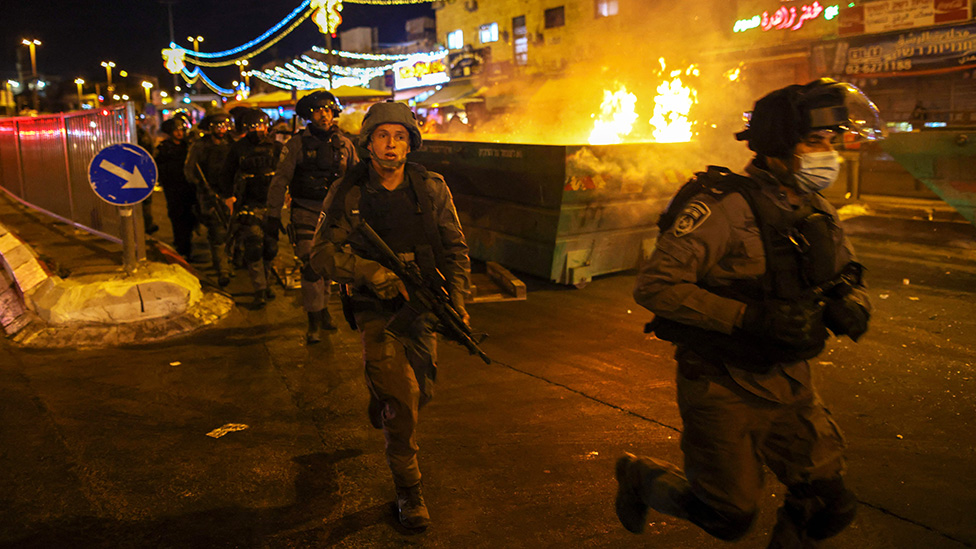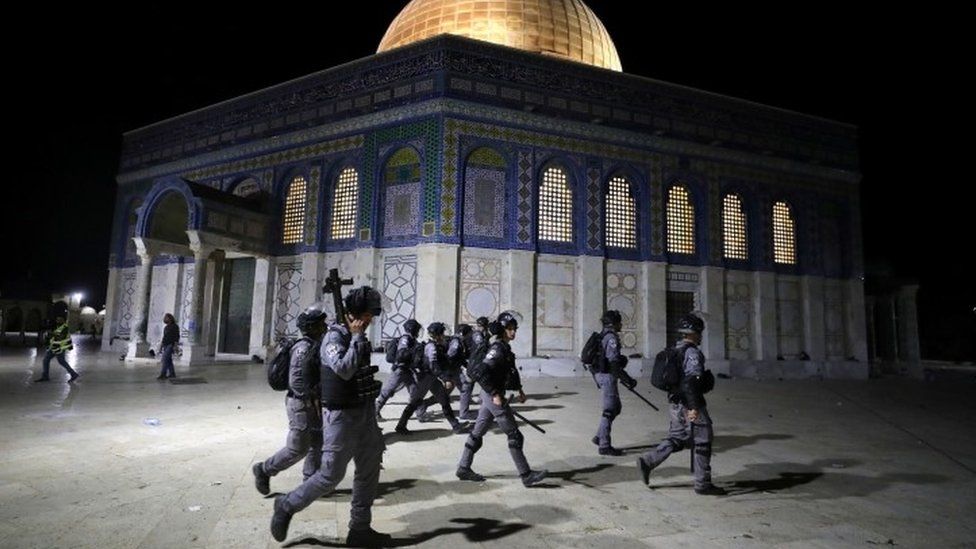Israel Gaza conflict: Netanyahu says strikes to 'continue at full force'
- Published
Israel's military operation against Palestinian Hamas militants in Gaza will continue "with full force", Prime Minister Benjamin Netanyahu has said.
"We are acting now, for as long as necessary, to restore calm... It will take time," Mr Netanyahu warned.
Gaza officials said 42 people, including 16 women and 10 children, died in the latest Israeli air strikes.
Ten people, including two children, have been killed in rocket attacks on Israel since Monday, Israel said.
The overall death toll in Gaza now stands at 188 people, including 55 children and 33 women, with 1,230 injured, according to the Hamas-controlled health ministry. Israel says dozens of militants are among the dead.
Israel's military says it has been targeting leaders and infrastructure linked to Hamas.
Hamas launched a new barrage of rockets towards southern Israel on Sunday afternoon.
Meanwhile, the UN Security Council is holding an emergency meeting, with international mediators hoping to broker a ceasefire.
UN Secretary General Antonio Guterres opened the meeting by describing the violence as "utterly appalling" and said the fighting must stop immediately.
The Israeli air strikes - the deadliest attack in the conflict so far - hit a busy street just after midnight on Sunday.
Palestinian rescue workers have been working through the rubble of at least three destroyed buildings, pulling out bodies and searching for survivors.
"I have never covered air strikes with such intensity, explosions are everywhere in Gaza, there are difficulties in communicating with officials to find out where the strikes are," said the BBC's Rushdi Abualouf in Gaza.
"The building in which I live in [the] western part of the city shook like an earthquake," he wrote on Twitter. "A hysterical state of chaos, children and women in the building that houses more than 200 people screaming."
Israel's military said it struck the homes of both Hamas leader Yahya Sinwar and his brother Muhammad Sinwar, whom it described as head of logistics and manpower for the movement.
Both residences had, it said, "served as military infrastructure" for Hamas.
Local sources confirmed to media that the Hamas leader's home in the Gaza town of Khan Younis had been bombed. There were no immediate reports about the fate of the two brothers.
It was unlikely they were at home at the time of the strikes, according to the Associated Press news agency.
Shortly after noon, rockets were launched by militants in Gaza against Ashkelon, Ashdod, Netivot and other parts of central and southern Israel, according to Israeli media. There were no reports of casualties.
The country's Iron Dome defence system has intercepted many of them.
The Israeli military said it had seen the highest ever concentration of rocket attacks on its territory during the past week.
On Sunday evening, Israeli police said there had been a car-ramming incident in the Sheikh Jarrah neighbourhood of East Jerusalem.
An Israeli police spokesman said the driver had been shot dead and four Israeli officers injured.
The threat to evict Palestinian families from Sheikh Jarrah to make way for Israeli settlers sparked the current round of violence between Israel and the Palestinians.
Those tensions culminated in clashes at a holy site revered by both Muslims and Jews. On Monday, Hamas began firing rockets after warning Israel to withdraw from the site, triggering retaliatory air strikes.
How likely is a ceasefire?
By Paul Adams, BBC diplomatic correspondent
Is Israel's military operation in Gaza, dubbed "Guardian of the Walls", nearing its conclusion?
Not obviously. Israeli Prime Minister Benjamin Netanyahu said the attacks are continuing with "full force" and will "take time".
In a news conference on Sunday, he admitted there were "pressures" but thanked US President Joe Biden, in particular, for his support.
Mr Biden's envoy, Hady Amr, has been in Israel since Friday, discussing the crisis with Israeli officials.
Unusually, at the end of a week that has also seen an alarming spate of intercommunal violence in mixed Jewish-Arab cities, he also met Israeli Arab leaders.
Since the US, like Israel and many other countries, regards Hamas as a terrorist organisation, Mr Amr will not be meeting one of the two warring parties.
Any messages for Hamas will have to go through traditional interlocutors, such as Egypt or Qatar.
Local reports suggest Hamas has been offering some kind of ceasefire for several days, only to be rebuffed by Israel, which clearly wants to inflict as much damage as it can on the militants before the fighting is finally brought to a close.
These episodes follow a familiar pattern: Israel presses home its undoubted military advantage until the international outcry over civilian casualties, and a deteriorating humanitarian situation in Gaza, demand that the operation end.
In Israel's estimation, we have not reached that point yet.
Are you in Israel or Gaza and affected by the fighting? Please share your story by emailing haveyoursay@bbc.co.uk.
Please include a contact number if you are willing to speak to a BBC journalist. You can also get in touch in the following ways:
If you are reading this page and can't see the form you will need to visit the mobile version of the BBC website to submit your question or comment or you can email us at HaveYourSay@bbc.co.uk. Please include your name, age and location with any submission.


